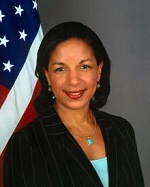Susan Rice and Africa's Despots
December 9, 2012
Susan Rice and Africa’s Despots
By SALEM SOLOMON–The New York Times
Tampa, Fla.
ON Sept. 2, Ambassador Susan E. Rice delivered a eulogy for a man she called “a true friend to me.” Before thousands of mourners and more than 20 African heads of state in Addis Ababa, Ethiopia, Ms. Rice, the United States’ representative to the United Nations, lauded the country’s late prime minister, Meles Zenawi. She called him “brilliant” – “a son of Ethiopia and a father to its rebirth.”
Few eulogies give a nuanced account of the decedent’s life, but the speech was part of a disturbing pattern for an official who could become President Obama’s next secretary of state. During her career, she has shown a surprising and unsettling sympathy for Africa’s despots.
This record dates from Ms. Rice’s service as assistant secretary of state for African affairs under President Bill Clinton, who in 1998 celebrated a “new generation” of African leaders, many of whom were ex-rebel commanders; among these leaders were Mr. Meles, Isaias Afewerki of Eritrea, Paul Kagame of Rwanda, Jerry J. Rawlings of Ghana, Thabo Mbeki of South Africa and Yoweri K. Museveni of Uganda.
“One hundred years from now your grandchildren and mine will look back and say this was the beginning of an African renaissance,” Mr. Clinton said in Accra, Ghana, in March 1998.
In remarks to a subcommittee of the Senate Committee on Foreign Relations that year, Ms. Rice was equally breathless about the continent’s future. “There is a new interest in individual freedom and a movement away from repressive, one-party systems,” she said. “It is with this new generation of Africans that we seek a dynamic, long-term partnership for the 21st century.”
Her optimism was misplaced. In the 14 years since, many of these leaders have tried on the strongman’s cloak and found that it fit nicely. Mr. Meles dismantled the rule of law, silenced political opponents and forged a single-party state. Mr. Isaias, Mr. Kagame and Mr. Museveni cling to their autocratic power. Only Mr. Rawlings and Mr. Mbeki left office willingly.
Ms. Rice’s enthusiasm for these leaders might have blinded her to some of their more questionable activities. Critics, including Howard W. French, a former correspondent for The New York Times, say that in the late 1990s, Ms. Rice tacitly approved of an invasion of the Democratic Republic of Congo that was orchestrated by Mr. Kagame of Rwanda and supported by Mr. Museveni of Uganda. In The New York Review of Books in 2009, Mr. French reported that witnesses had heard Ms. Rice describe the two men as the best insurance against genocide in the region. “They know how to deal with that,” he reported her as having said. “The only thing we have to do is look the other way.” Ms. Rice has denied supporting the invasion.
More recently, according to Jason K. Stearns, a scholar of the region, Ms. Rice temporarily blocked a United Nations report documenting Rwanda’s support for the M23 rebel group now operating in eastern Congo, and later moved to delete language critical of Rwanda and Uganda from a Security Council resolution. “According to former colleagues, she feels that more can be achieved by constructive engagement, not public censure,” Mr. Stearns wrote recently on Foreign Policy’s Web site.
Ms. Rice’s relationship with Mr. Meles – which dates from 1998, when she was a mediator in an ultimately unsuccessful effort to prevent war between Eritrea and Ethiopia – also calls her judgment into question.
In fairness, in her eulogy, Ms. Rice said she differed with Mr. Meles on questions like democracy and human rights. But if so, the message did not get through; under Mr. Meles during the past 15 years, democracy and the rule of law in Ethiopia steadily deteriorated. Ethiopia imprisoned dissidents and journalists, used food aid as a political tool, appropriated vast sections of land from its citizens and prevented the United Nations from demarcating its border with Eritrea.
Meanwhile, across multiple administrations, the United States has favored Ethiopia as an ally and a perceived bulwark against extremism in the region. In 2012 the nation received $580 million in American foreign aid.
Eritrea is no innocent. It has closed itself off, stifled dissent and forced its young people to choose between endless military service at home and seeking asylum abroad. But I believe that the Security Council, with Ms. Rice’s support, went too far in imposing sanctions on Eritrea in 2009 for supporting extremists.
President Obama has visited sub-Saharan Africa just once in his first term – a brief stop in Ghana. One signal that he plans to focus more on Africa – and on human rights and democracy, not only economic development and geopolitics – in his next term would be to nominate someone other than Susan Rice as America’s top diplomat.
Salem Solomon is an Eritrean-American journalist who runs Africa Talks, a news and opinion Web site covering Africa and the global African diaspora.
No comments yet.
Add your comment